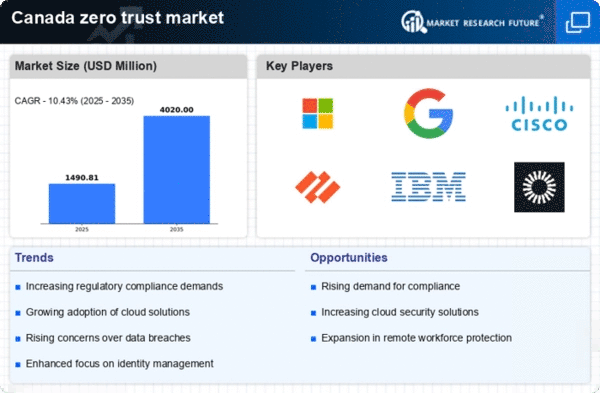Shift Towards Remote Work
The shift towards remote work in Canada has significantly influenced the zero trust-security market. As more employees work from home, traditional perimeter-based security models become less effective. This transition necessitates a reevaluation of security strategies, leading to an increased adoption of zero trust frameworks. Organizations are investing in technologies that ensure secure access to resources regardless of location. The zero trust-security market is projected to grow by approximately 25% annually as companies implement solutions that provide secure remote access. This trend highlights the importance of continuous monitoring and verification of user identities, which are core principles of zero trust. Consequently, the market is likely to see a surge in demand for solutions that facilitate secure remote work environments.
Rising Cyber Threat Landscape
The increasing frequency and sophistication of cyber threats in Canada is a primary driver for the zero trust-security market. Organizations are facing a myriad of attacks, including ransomware and phishing, which have surged by over 30% in recent years. This alarming trend compels businesses to adopt zero trust principles, which emphasize strict identity verification and access controls. The zero trust-security market is projected to grow as companies seek to mitigate risks associated with these threats. In 2025, the market is expected to reach a valuation of approximately $2 billion in Canada, reflecting a growing recognition of the need for robust security frameworks. As organizations prioritize cybersecurity, the zero trust-security market is likely to expand, driven by the necessity to protect sensitive data and maintain operational integrity.
Growing Awareness of Data Privacy
The increasing awareness of data privacy among consumers and businesses in Canada is significantly impacting the zero trust-security market. As individuals become more conscious of how their data is used and protected, organizations are compelled to adopt security measures that align with these expectations. This shift is evident in the rising demand for solutions that ensure data protection and privacy compliance. The zero trust-security market is likely to expand as businesses implement frameworks that prioritize user privacy and secure data handling practices. With a projected growth rate of 20% in the coming years, the market reflects a broader societal trend towards valuing data privacy. This awareness not only drives demand for zero trust solutions but also encourages organizations to foster trust with their customers through enhanced security measures.
Regulatory Pressures and Compliance
Regulatory pressures in Canada are driving the zero trust-security market as organizations strive to comply with stringent data protection laws. The Personal Information Protection and Electronic Documents Act (PIPEDA) mandates that businesses implement adequate security measures to protect personal data. Failure to comply can result in hefty fines, which may reach up to $100,000. This regulatory landscape compels organizations to adopt zero trust principles, which align with compliance requirements by ensuring that access to sensitive information is tightly controlled. The zero trust-security market is expected to benefit from this trend, as companies invest in solutions that not only enhance security but also facilitate compliance with evolving regulations. As a result, the market is likely to experience steady growth, driven by the need for organizations to mitigate legal risks.
Increased Investment in Cybersecurity
The growing recognition of cybersecurity as a critical business priority is propelling the zero trust-security market in Canada. Organizations are allocating larger portions of their budgets to cybersecurity initiatives, with an estimated increase of 15% in spending over the next year. This heightened investment reflects a shift in mindset, where businesses view cybersecurity not merely as a cost but as a vital component of their operational strategy. The zero trust-security market stands to gain from this trend, as companies seek comprehensive solutions that address the complexities of modern cyber threats. As organizations prioritize security, the demand for zero trust frameworks is likely to rise, leading to a more robust market landscape. This investment trend indicates a long-term commitment to enhancing security postures across various sectors.
















